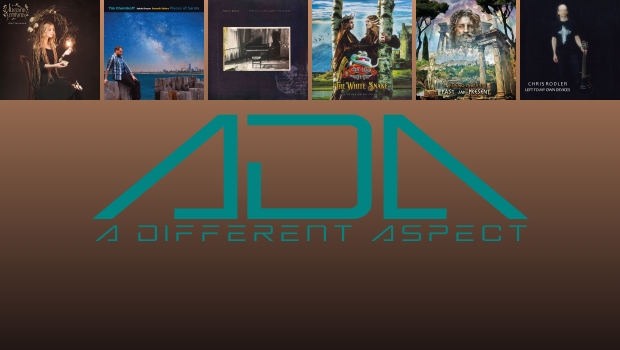Featured artists: Mariana Semkina | Haiku Salut | Tim Chernikoff | The Samurai of Prog | Kimmo Pörsti | Chris Rodler ||:
In this ADA (shorter reviews) update TPA’s David Edwards, Bob Mulvey & Kevan Furbank check out recent albums, EPs & singles from:
• Mariana Semkina – Disillusioned [EP]
• Haiku Salut – The Hill, The Light, The Ghost
• Tim Chernikoff – Pieces Of Sanity
• The Samurai of Prog – The White Snake and Other Grimm Tales II
• Kimmo Pörsti – Past and Present
• Chris Rodler – Left To My Own Devices
David Edwards
![Mariana Semkina - Disillusioned [EP] Mariana Semkina - Disillusioned [EP]](https://theprogressiveaspect.net/wp-content/uploads/2021/10/Mariana-Semkina_ADA.jpg)
Following on from her first solo album Sleepwalking, released at the start of 2020, Mariana Semkina has self-released an EP called Disillusioned. Consisting of five tracks, they continue to showcase a voice both angelic and delicate. Once again, the piano of her iamthemorning compatriot Gleb Kolyadin is absent – but this does help to give the music a more distinctive feel, whilst still having echoes of the neo-classical, chamber, folk and prog amalgam of styles which the group’s four albums have previously created.
The sad, pre-Raphaelite and melancholic ambience remains. However, here the folky elements are more in the background and the musical instrumentation is sparser and more minimalist, with an atmospheric electronica-feel to the guitar and keyboards dominating the background to Mariana’s yearning and fragile voice.
The EP very much represents a fresh start for her, in that the Patreon financial support scheme has provided her with more creative control and responsibility for her own work – something she is keen to embrace. The title partly reflects her state of mind as she wrote it, and her experience of being stuck in her native Russia after what should have been a week’s visit, due to pandemic-related border closures. This led, in her own words, to ‘quite a bad depression’. However, now relocated back in the UK, she has been able to regain her creative spark and return to her musical journey – with the remote support of her fellow musicians during the recording process – and produce something she is rightly very proud of.
Friends opens up with dark, haunting, electronica and effects before Mariana’s plaintive vocals, reflecting on the death of a friend, draw you into its unsettling heart. The song unfolds and becomes more dynamic as a string quartet join in, prior to ethereal harmonies closing it out. The accompanying video release complement the raw, Gothic emotion very well.
Ne Hagyj Itt (Don’t Leave Me) is a short, choir-like rendition of a Hungarian folk song by Bela Bartok, Mariana’s multi-tracked vocals truly soaring over a subtle musical background. Disillusioned is the heart of the EP and flows more serenely and brightly. Mariana’s vocals are more varied and the spritely guitar and keyboards of Vlad Avy and Grigoriy Losenkov, respectively, contrast well with the soothing strings.
The second, choir-influenced folk piece, Land Mins Fodur (My Father’s Country), is sung in Icelandic. Mariana states that the choir pieces were a homage to the two places she loves to visit – Iceland and Hungary – with each language working differently, yet beautifully with music. Almost Enya-like, her layered voices have a serenity and depth despite the track only having a duration of under two minutes.
An End concludes proceedings, with chimed guitars complementing Mariana’s wistful and sad tones at the start before piano and violins build-up the atmosphere – which is an intriguing mix of dark and light. The whole track ebbs and flows hauntingly and brings the short EP to a satisfactory close – although leaving you with an appetite for more.
Overall, Mariana’s EP provides a tantalising taste of future endeavours for fans of iamthemorning and introspective vocal-led chamber music with folk influences. Progressive elements for sure, rather than identifiably ‘prog’ in nature – it deserves a wide and diverse audience and provide her with the support to soar even higher with a full album release in due course. Available from Bandcamp.
Bob Mulvey
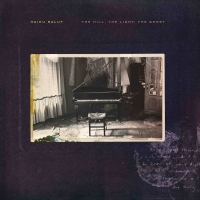
There are times when what is needed most is to clear the mind whilst gradually letting quietude fill the space created. In recent months Haiku Salut’s fifth and latest album, The Hill, The Light, The Ghost, has provided the perfect solution. Wonderfully atmospheric and full of tranquil ambience, the album soothes, gently caressing the soul, albeit tinged with an air of illusory unease.
Haiku Salut are three multi-instrumentalists Gemma Barkerwood, Sophie Barkerwood and Louise Croft who craft a whole host of traditional instruments combining them with modern day electronica and technology. Or as they affectionately call it “loopery and laptopery”. For their latest release, Sophie Barkerwood has added field recordings, taken in different locations, to form the basis of and to strengthen the album’s overall theme. And it is the album’s concepts that makes The Hill, The Light, The Ghost such a compelling and compulsive experience.
For instance, there’s a fascinating tale surrounding the album’s second track, Entering, one that encapsulates the spirit of The Hill, The Light, The Ghost. It also nicely ties in the front cover design with a grand piano set in a dilapidated room. The song was inspired by a visit to an abandoned house in Germany in 2019. “I had heard there was a library and a grand piano in there that I wanted to sample. I didn’t care that it would be out of tune, it was the piano’s ghost we wanted. Other people’s memories. The house was huge. Even though people visit it a lot most of the residents belongings were still there: clothes, kitchen utensils, dead people’s handwriting.”
Across the album, each track has its own unfolding storyline and much is left to the listener to interpret, however with such a diversity of audio textures the permutations are seemingly endless in scope. There’s the hypnotic keyboards, with swelling and reversed sounds in We Need Those Beams which conjure images of the Aurora, which neatly lead into the sparsely rhythmic but ever evolving I Dreamed I Was Awake For A Very Long Time. Elements from both these tracks are manifested in the tantalising choirs which adorn How The Day Starts. It is however Haiku Salut’s ability to finely balance all these elements that makes this album truly fascinating, and one that reveals more with each and every listening.
The Hill, The Light, The Ghost is a well conceived, cleverly written album, full of ethereal imagery. If you allow Wide Awake, the album’s superlative opener, to ensnare you, then the album will hold you spellbound until the soothing textures of All Clear releases that grip.
Kevan Furbank
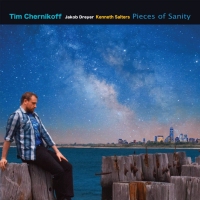
The jazz world is stuffed to the brim with piano-led trios, and most of them don’t warrant much of a mention on a progressive music website. One or two transcend the genre through melodic, structural and instrumental invention – chief among these would, I guess, be the Neil Cowley and Esbjörn Svensson trios (both sadly and, in the case of Svensson, tragically defunct).
Californian Tim Chernikoff doesn’t quite get there in Pieces of Sanity but there’s still plenty to enjoy in this bold, muscular debut – he attacks the piano with pace and confidence, aided and abetted by precision bass playing from Jakob Dreyer.
There are hints of Chick Corea, Keith Jarrett and Herbie Hancock here as he powers his way through a selection of mostly his own compositions that emphasise sound textures and moods rather than melodies, with a couple of covers including Wayne Shorter’s Orbits and an old Rodgers and Hart evergreen.
Sometimes the drama sounds a bit forced, and one wishes for a bit of melody to latch on to rather than a sequence of frenetic chords and phrases, and there’s not enough variety – most of the tracks sound quite similar – but I like the stories behind the tunes on the CD artwork and it’s clear Chernikoff is a hugely proficient player.
David Edwards
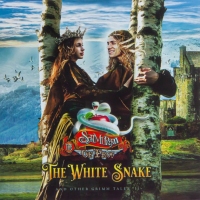
For those new to them, The Samurai of Prog is a multi-national symphonic prog rock project dating back to 2009, led by Finland-based, Italian composer and bassist Marco Bernard, with permanent members Steve Unruh on vocals, violin, flute and guitars, and Kimmo Pörsti on drums and percussion – along with a raft of guest musicians and vocalists.
I reviewed The Lady and the Lion – volume one of a new series of albums based on the fairy tales of the Brothers Grimm – a few months ago. The White Snake is volume two, and I was interested in seeing how the series has developed and how it compared with the first album.
I am pleased to say that the quality of the instrumental symphonic prog produced by the project remains of a high standard. The solid foundation that Marco, Steve and Kimmo create is enhanced by the talented guest musicians they have employed – especially on keyboards and electric guitar. The music is dynamic and diverse and full of invention that would please any followers of the genre.
However, whether you take to the album or not will largely depend on the lyrics and vocal approach. This is fairy tale storytelling prog style! It can often feel like a commentary over a local theatre group’s Christmas pantomime. However, on this occasion, the vocals are much less melodramatic and integrate better with the musical flow and structure of the longer, narrative-led tracks, compared to the last album.
The first two tracks are instrumentals and work well. The Tricky Fiddler is a brisk and busy track, not surprisingly dominated by Steve’s violin, which combining playfully with lush retro-keyboards, flute and lively electric guitar creates a Kansas/Tull hybrid at times. Searching for the Fear is more of an ensemble piece, with each musician seemingly allowed to take the lead as the track ebbs and flows – all propelled by Kimmo’s drumming – with prog noodlings a plenty, especially from the guest keyboards and guitar of Alessandro Di Benedetti and Marcel Singor, respectively.
The three, longer, storytelling tracks are each composed by a different guest keyboardist, and the four-part The Devil with the Three Golden Hairs by Mimmo Ferri fares least well. The promising instrumentation (including some nice guitar soloing) is often swamped by the densely-packed lyrical content, and although the vocals are slightly less theatrical than the first album, they are still overdramatic at times. The Travelling Musicians, by Luca Scherani, is better, however, lyrics and music well integrated and it flows more easily, and whilst you still feel you are listening to a stage musical at times, the vocals are stronger – especially Elisa Montaldo as the cat and Alessio Calandriello as the rooster (just wish I could understand Italian!)
The five-part epic The White Snake has music composed by Oliviero Lacagnina, and is rather good. Fans of ELP/Triumvirat will enjoy the retro keyboards and synthesised orchestration of the Prologue onwards. At times there is a theatrical grandeur similar to ELP’s Pirates. The narrative content is stronger too, with Camilla Rinaldi’s vocals easy on the ear and Massimo Gori’s lyrics never dominating the instrumentation. Violin, keyboards and guitars utilise the additional space given to them more effectively, and there is even some nice Irish flute playing before the proggy conclusion. The final, short instrumental The Tricky Fiddler – Reprise rounds off the album with a more restrained, stately return to the original opening theme before a final swirl of violin.
A step up from the previous album, although despite the impressive prog instrumentation, it will largely be your liking of musical theatre and lyrical storytelling which will decide if this album, the previous one or any future releases to come from The Samurai of Prog are for you.
Bob Mulvey
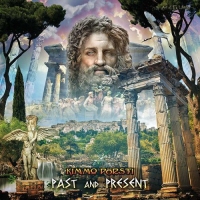
There was a 23-year hiatus between Kimmo Pörsti’s first solo album, Ihmeellinen iltapäivä released in 1997, and his second, Wayfarer, released last year. However, only a year separates Wayfarer from Past and Present, his latest album, released a month or so ago. To say Kimmo Pörsti is on something of a role at the moment would be an understatement, with three studio albums with The Samurai of Prog, two as Bernard & Pörsti, a side project under the moniker of The Guildmaster and the aforementioned solo album all released within a two year window.
Wayfarer was, in many respects, a snapshot of the many facets of Pörsti’s musical output, bringing in a diverse range of styles and influences, while including his involvement with The Samurai of Prog, Paidarion and Mist Season. Past and Present continues the trend, combining older and newer material as the title suggests – five older tracks and six new compositions.
Representing the past we have the enjoyable jazzy/funky title tune, reminiscent of Mist Season, although originally from Jan-Olof Strandberg’s Made in Finland (2012), whereas Dance of the Mistresses is a reworked track by Mist Season – and a joyous tune it is too. Folky elements dance to the tune of Ton Scherpenzeel’s vintage synths and Rafael Pascha’s electric guitar.
Moving to the present, melody and harmony sweetly intermingle in the delightful folky tune Sorrow and Recovery, which precedes Dance of the Mistresses. Initially the music takes us on a pleasant country stroll, and here Hanna Pörsti’s airy flute is enchanting. However once the tempo picks up, she quickly shows she is more than a match for Scherpenzeel’s synths and Pascha’s guitar.
Past and Present is predominantly instrumental, but there are a couple of ‘songs’; Changewinds is a track of many twists and turns, featuring the characterful voice of Carlos Espejo underpinned by Paula Pörsti;s angelic backing vocals. In contrast, Dan Schamber’s softer tones embellish the funk rock stomper Darker Places, which includes an organ solo from Scherpenzeel along with some brass punctuation from Marek Arnold (saxes) and Marc Papeghin (trumpet).
Although the material is culled from different eras, the album flows and, if not indicated, you would be hard pushed to tell old from new. Prime example is the album’s strong mid-section of Sorrow and Recovery and Dance of the Mistresses.
As with The Samurai of Prog releases, Kimmo Pörsti has called upon long-time collaborator Ed Unisky for the extensive album artwork.
Bob Mulvey
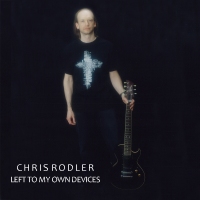
Now here’s a blast from the past. In the early ’00s, the Rodler Brothers, Chris (guitar & bass) and Brett (drums), released a couple of albums under the name Razor Wire Shrine. Well executed instrumentals, full of oddly metered, polyrhythmic metallic mayhem, with smatterings of jazz and funk thrown in for good measure. There were other bands/projects also featuring the brothers: Ledger De Main, Gratto and Andeavour. My introduction to the Rodlers however started in 2003 with Mythologic’s Standing In Stillness. There was a third Rodler then, Melissa, who added some engaging vocals throughout. Again an album towards the heavier end of the ‘proggy’ spectrum with hues of Rush. Must dig it out and have a listen…
Moving on to 2021 and multi-instrumentalist Chris has returned following a fourteen year absence. From the opening bars of track one The Unravelling there’s an immediate familial sound, whereas Compound Fra(KC)tion reaffirms the R.W.S. links to Mr Fripp’s work. And as the the album unravels, there are triggers back to those earlier R.W.S. albums. Neither R.W.S. albums were what you would call ‘easy listens’ and the same applies here. Left To My Own Devices is an intense ride, always challenging, full of twisting, exigent harmonic intervals, layered across ever shifting rhythms and with little in the way of respite offered. Not that that’s a negative, just a little demanding.
Having now reacquainted myself with the two Razor Wire Shrine albums, I was curious why Brett was not on the new recordings, so I dropped Chris an email. The upshot was that Brett had called it day on the musical front. I did find Left To My Own Devices missed the dynamism of Brett, not that the drumming is bad, it just lacked that zestful spark. Still, great to see Chris Rodler back making music, and if you are in the market for some absorbing guitar instrumentals then Left To My Own Devices is well worth checking out.

